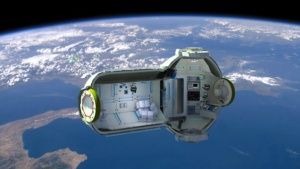First space hotel gets lift off

Russian space group Energiya in partnership with America’s Orbital Technologies have won the tender to build the world’s first space hotel, complete with a menu devised by celebrity chefs. The hotel will house up to seven space tourists, and also double up as an emergency overspill refuge for astronauts.
The Commercial Space Station will also serve as a landmark project that aims to pull further investment into Russia’s space industry.
The hotel would serve as “a true gateway to the rest of the solar system,” Energiya said in a statement. “A short stop over at our station will be the perfect beginning to a manned circumlunar flight.”
But it’s unlikely to come anytime soon - the company wants to launch a seven-room station by 2016 but may increase or decrease that capacity based on customer demand.
Sergey Kostenko, the chief executive of Orbital Technologies, said that the CSS would “provide a unique destination for commercial, state and private spaceflight missions,” creating a “valuable addition to the global base of orbital assets.”
ADVERTISEMENT
Russia began space tourism in 2001, charging up to $35m to ship travellers to the International Space Station, a research station run by five countries, including the US.
All the space tourists who have traveled to the International Space Station were trained in Russia and sent into orbit on Russian Soyuz capsules, although their trips were organized by a Virginia-based Space Adventures.
Canadian Cirque du Soleil founder Guy Laliberte, who spent 12 days in space in September 2009, was the last space tourist to travel to the station. Russia halted space tourism this year after the crew size was increased, using the seats in Soyuz that would have been sold to paying travellers.
Several start-up companies are aiming to make space tourism more accessible to the masses, including Richard Branson’s Virgin Galactic, which is building a space ship with California-based Mojave Aerospace that will eventually offer $200,000 trips into space.

